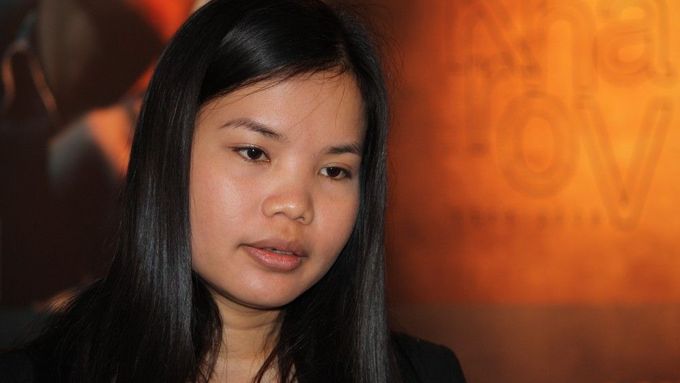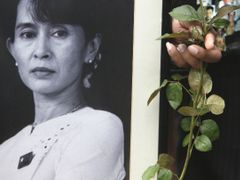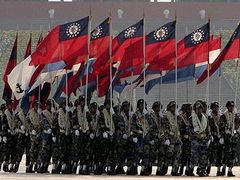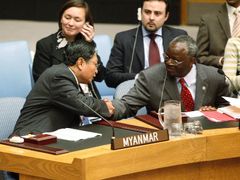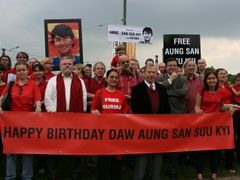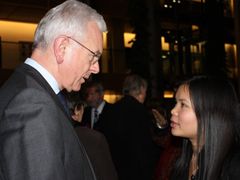Strasbourg - Aung San Suu Kyi, the leader of the movement for democracy in the military junta-run Burma, is arguably the most prominent prisoner of conscience in the world today.
Having spent more than 13 of the last 19 years (and counting) under house arrest, it was no surprise she was not available for a grand get-together of the past Sakharov Prize winners in Strasbourg last week.
Sakharov Prize is an award given annually by the European Parliament to the champions of the freedom of thought. Aung San Suu Kyi got the honour in the year 1990 and even back then she had to excuse herself from the ceremony for the very same reasons as today.
But a young pro-democracy activist Zoya Phan who is based in London and works as a campaigns officer for Burma Campaign UK was in Strasbourg to substitute for "The Lady", as Aung San Suu Kyi is popularly known in her motherland, and she gave an interview to Aktuálně.cz about the immediate prospects of the movement that both she and her more famous compatriot dedicated their lives to.
Aktuálně.cz: Have you ever met Aung San Suu Kyi in person?
Zoya Phan: No. I have heard about her when I was little, but I didn't know exactly who she was. But when I came to the UK as a student, I went to a demonstration in front of a Burmese embassy for Aung San Suu Kyi's birthday and I was asked to do the emceeing, to chair the protest. And then I started learning more about her and I came to admire her. The more I learned about her and the more I became politically active on the Burmese issues, the more inspiration I drew from her own work and commitment to the people of Burma and how much people in Burma love her and trust her as their leader.
If there really is election in Burma in 2010, as the junta announced, do you think that the opposition should unite in boycotting it? There are already reports claiming that some opposition figures are thinking about contesting the ballot.
Well, this election is a part of the seven-step roadmap, which is rigged and the regime had set it up simply to maintain their political power and control over the civilians. It is nothing to benefit the civilians and the people know clearly about that and everyone in the international community knows that this is just a ploy by the regime to stay in power.
Given the situation in Burma, it is quite difficult for the dissidents and the ethnic groups to say so but for us in exile we are able to speak freely without risking imprisonment, so we do not agree with this 2010 election and we call for a boycott as this will not give any political space and freedom for the opposition and ethnic people and for our survival, so we cannot accept this. But for the people inside Burma, they are in a difficult position, and I cannot speak on their behalf because they know best.
But I believe that what we need to do is to focus on the international community where we should get stronger action from the European Union to impose targeted economic sanctions against the regime to cut their economic lifeline and get the UN Security Council to take action, pass a resolution on Burma and put pressure with a combination of political and economic pressure where it will force the regime into negotiations and dialogue with opposition and ethnic nationalities' group.
But don't you think that the diplomatic offensive should start with targeting the ASEAN countries? Myanmar as a member of the group is perhaps most likely to listen to their voice. Besides they have signed up to the ASEAN Charter which includes provisions on the protection of human rights etc. And we certainly haven't seen much action coming from ASEAN lately.
Well, I agree that Burma is part of the ASEAN and we should see more action from ASEAN, but the nine years of the "constructive engagement" policy of ASEAN has failed the people in Burma, it's very weak and it has not brought any constructive outcome in Burma. So it is very important that we get the European Union and the UN to do more, to impose stronger action against the regime and at the same time to use its influence to get ASEAN and Asian leaders to put more pressure on the regime and force it into negotiations and dialogue with the opposition and the ethnic groups.
One could say that the UN approach has been just as toothless. In fact, the repeated visits by special representative of UN Secretary General for Myanmar (the official name of the country, which the opposition as well as some Western governments do not accept) Ibrahim Gambari have come under heavy criticism in the Burmese pro-democracy circles. What exactly would you like the UN to do?
What we have been calling for, and for many years now, is that UN Secretary General should go to Burma himself to talk to the generals and ASSK plus other democracy and ethnic leaders and help facilitate negotiations between these groups and secure the release of all political prisoners including ASSK. The longer we wait, the more people will suffer and die. So it is very urgent that EU urged Ban Ki-moon to go to Burma now and secure the release of all the political prisoners.
I believe he was suggesting he may go as early as December, but it seems like it is not going to happen now…
He said he wouldn't go unless he saw (guarantees of) some positive outcome from his trip and I think it's not right. What we need from him is to go and make this positive outcome (happen). He can't just wait in his office to see some positive change in Burma, he has to go and deliver change, because he is the Secretary General of the UN and he has the responsibility to help the people in Burma.
Czech Republic is going to preside over EU for the next six months and while our diplomacy has been among the most vocal ones when it comes to support for democracy in Burma, our Foreign Minister recently said he is not too optimistic about the prospects for change in Burma, saying this will require a very long process. How can this spirit of defeatism be overcome, in your mind?
I think it is very important that the Czech Republic keep the Burma issue on the EU agenda during its presidency and continue its support for human rights and democracy in Burma as it has up until now.
Because of the consequences of the Saffron uprising which the Burmese regime stopped by opening fire on the protesters, killing many and arresting hundreds of people who have since ended up in prison, the situation is getting worse. For those who organized last year's protests, some of them were given sentences of up to 65 years recently.
Also, in May this year, when the cyclone Nargis hit the area the regime failed to help the people affected by the disaster and they also desperately blocked the international humanitarian aid from reaching these people. But it wasn't just a failure of the regime but also a failure of the international community to take action against the regime, both after the violent suppression of last year's protests and this year's cyclone disaster. Response from the international community was too weak and the regime got away with the murder. We don't have to let this happen any more, we can't accept this.
So what would be the preferable approach by the international community, in your mind?
What we need to see is more targeted economic sanctions imposed by the EU against the regime to force it to negotiate with the opposition and the ethnic nationalities. These targeted economic sanctions we are calling for should include gas and oil, gems and timber.
These are not blanket sanctions that would hit agricultural sector and the Burmese people, because 75 per cent of the people work in agriculture and we don't want to hurt civilians, we want to hurt the regime and its business cronies, cut their economic lifeline that will force them into negotiations.
At the same time we need UN to employ more political pressure on the regime and use its influence to talk to ASEAN countries and Asian countries like China and India to stop supporting the regime militarily, politically, economically and stand for the people in Burma.
People in Burma do whatever they can and they want this generation to be the last one to suffer under this dictatorship. They do whatever they can - they protest in the streets but as a result they only get tear-gas and gun fire. So it is very important that we keep hope for the people in Burma and this flame of hope should stay alive with the help from the international community and I believe governments should prioritize human rights in their foreign policy, not economic interests.
